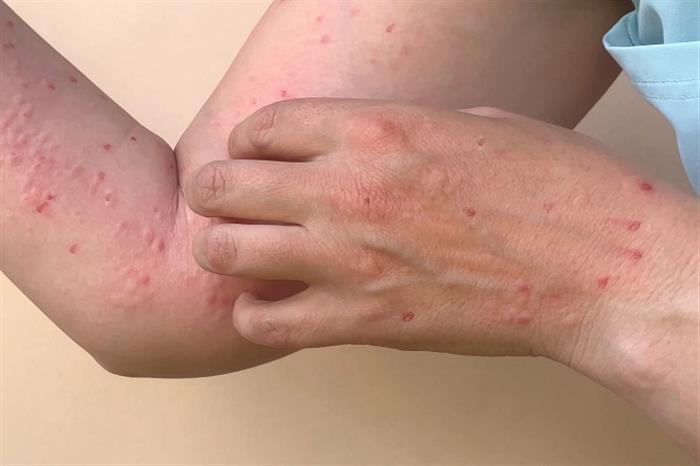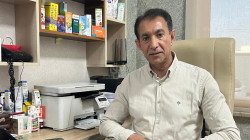Despite zero case count, Iraq buckles up for the Monkeypox

Shafaq News/ Iraqi health authorities are on high alert as monkeypox cases continue to rise globally. While the country has yet to report confirmed infections, officials assured that the government is closely monitoring the situation and has already implemented preventive measures.
"We are closely following the latest developments with the World Health Organization and relevant authorities, both inside and outside Iraq," said Dr. Raba Falah Hassan, a spokesperson for the Iraqi Health Ministry. "Health teams are deployed at border crossings and airports to screen for the disease, and any suspected cases are isolated and tested."
Hassan's comments echo the official stance of the Iraqi government, which has repeatedly assured the public that the country is well-prepared to respond to a potential outbreak. However, the recent declaration of a public health emergency by the World Health Organization has heightened concerns among health officials and the public alike.
Immediately after the announcement, the health department in Kirkuk said it had increased preventive measures at the local airport for travelers arriving from affected areas. Similarly, the Kurdistan Regional Government's Ministry of Health has declared a state of alertness and intensified surveillance efforts.
"We are taking all necessary precautions to prevent its spread," said the Kurdistan Regional Government's Ministry of Health spokesperson.
What Is Monkeypox?
Monkeypox, a viral illness that can cause a painful rash, swollen lymph nodes, and fever, is spreading rapidly through close contact with infected individuals or animals. Experts warn that anyone can contract the disease, regardless of age or health status.
"The virus, also known as Mpox, can be transmitted through various means, including touching, kissing, sexual contact, and contact with infected animals," said Dr. Firas Riad Jameel, a professor of biotechnology and infectious diseases. "It can also spread through contaminated materials such as sheets, clothing, or needles."
While the disease is typically not fatal, it can cause severe complications in some cases. Health experts emphasize the importance of early diagnosis and treatment to prevent the spread of the virus and minimize its impact.
"Vaccination is available for people at high risk of exposure, such as healthcare workers and laboratory personnel," said Dr. Jameel. "It is crucial to follow the guidelines set by health authorities to protect oneself and others from infection."
"The public is advised to be aware of the symptoms…Anyone experiencing these symptoms should seek medical attention immediately."
Fears And Concerns
The news of potential Mpox cases in Iraq has sparked fear and uncertainty among the local population. Iraqis, who are yet to recover from the economic and emotional aftermath of the COVID-19 pandemic, receive the news about another infectious disease with much concern and fear.
Last week, health officials in the southern Iraqi governorate of Dhi Qar said they were investigating a suspected case in a foreign national. The patient, whose nationality has not been disclosed, is currently under medical observation and has presented symptoms similar to those of chickenpox.
While the initial diagnosis points towards chickenpox, a source said, "Concerns have been raised about the possibility of a monkeypox infection. Samples have been sent to a central laboratory in Baghdad for further analysis."
The news was particularly distressing to the parents of children with chronic illnesses in the country, who urged the Ministry of Education to reinstate home-based learning programs.
"Our children have undergone organ transplants or suffer from chronic diseases, making them extremely vulnerable to infections," said one parent, speaking on behalf of a group of parents. "We fear that sending them to school would put their lives at risk."
The parents emphasized the importance of considering the unique circumstances of sick students and argued that home-based learning would prevent them from facing unnecessary health risks.
"We need clear and early guidelines about home-based learning to avoid the annual confusion and stress caused by uncertainty," another parent said.
Yesterday, a World Health Organization official assured that Mpox, regardless of whether it is the new or old strain, is not the new COVID, as authorities know how to control its spread.
"We can and must tackle Mpox together," said Hans Kluge, WHO regional director for Europe, in a U.N. media briefing.
"So will we choose to put the systems in place to control and eliminate Mpox globally? Or will we enter another cycle of panic and neglect? How we respond now and in the years to come will prove a critical test for Europe and the world," he added.
More Yet To Come
The escalating Mpox outbreak is causing alarm among some health experts, who warn that the latest strain of the virus could be more fast-spreading and deadly than an early 2022 outbreak.
The World Health Organization last week declared Mpox a global public health emergency following the spread of an outbreak in the Democratic Republic of Congo (DRC) to neighboring countries.
Since the new outbreak, cases have been identified in countries where Mpox is not endemic, such as Sweden, Pakistan, and Thailand — although it's unclear which strain has been identified in some of these nations.
The variant Clade 1 is already known for causing more severe disease in young children, pregnant women, and immunocompromised people. That has hastened the outbreak in countries with more prevalent health conditions and poorer healthcare systems.
"As Mpox disease is more severe in immunocompromised individuals, it is also a concern that the current outbreak is taking place in a region where HIV prevalence is relatively high but access to antiretroviral drugs is poor," said Brian Ferguson, associate professor of immunology at the University of Cambridge.
Ongoing conflicts in parts of Africa — such as the DRC, where a large number of displaced people have relocated to refugee camps — have also worsened sanitation conditions and accelerated the spread.
So far this year, more than 15,000 cases and at least 537 deaths have been reported from the outbreak in the DRC, according to the WHO, with more cases reported elsewhere.
Ferguson said that more cases will likely be identified in the coming days and weeks given the lack of controls to prevent the spread from country to country. He also said that lessons had not been learned from the prior outbreak and declared a public health emergency in July 2022 before the designation was removed in May 2023.





